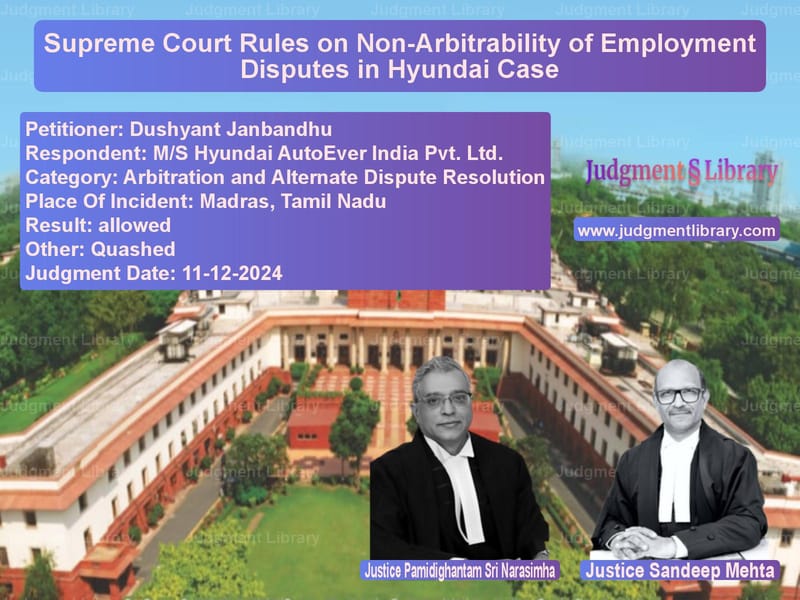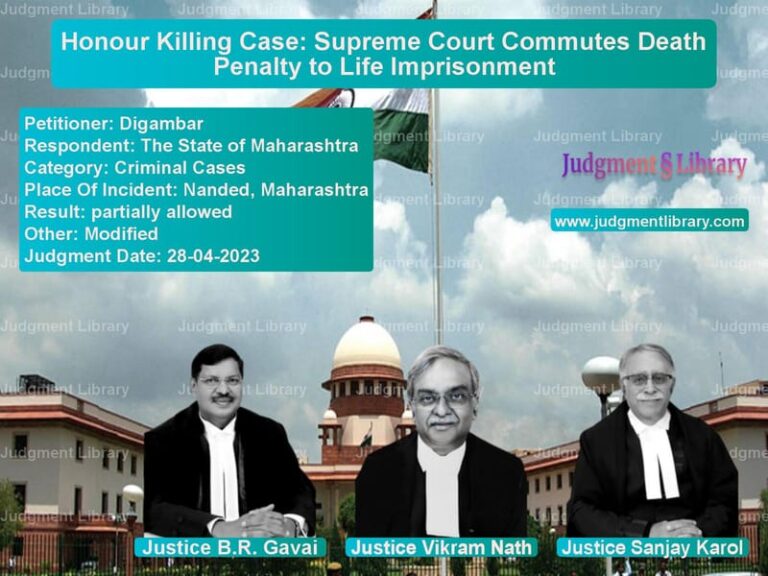Supreme Court Rules on Non-Arbitrability of Employment Disputes in Hyundai Case
The Supreme Court of India recently ruled in the case of Dushyant Janbandhu vs. M/S Hyundai AutoEver India Pvt. Ltd., addressing crucial questions regarding employment disputes, arbitration agreements, and the jurisdiction of statutory authorities. The judgment, delivered by Pamidighantam Sri Narasimha and Sandeep Mehta, emphasized the principle that disputes concerning wages and wrongful termination fall outside the scope of arbitration under the Arbitration and Conciliation Act, 1996.
Background of the Case
The appellant, Dushyant Janbandhu, was employed as an Assistant Manager at M/S Hyundai AutoEver India Pvt. Ltd. from March 15, 2019. The dispute arose during the COVID-19 pandemic when the appellant was directed to resume work from the office despite having been working remotely since March 22, 2020. His refusal to comply led to a disciplinary inquiry and subsequent termination on January 21, 2021.
The appellant filed a claim for unpaid wages under the Payment of Wages Act, 1936, and a challenge against wrongful termination under the Industrial Disputes Act, 1947. In response, the employer initiated arbitration proceedings based on an arbitration clause in the employment agreement. The High Court of Madras appointed an arbitrator under Section 11(6) of the Arbitration and Conciliation Act, prompting the appellant to challenge the appointment before the Supreme Court.
Key Legal Issues
- Whether employment-related disputes, including wrongful termination and wage claims, are arbitrable under the Arbitration and Conciliation Act.
- Whether the High Court erred in appointing an arbitrator despite statutory remedies being available under labor laws.
- Whether Hyundai’s reliance on an arbitration clause was an abuse of process.
Petitioner’s Arguments
The appellant contended that:
- His claim for unpaid wages was already pending before the Payment of Wages Authority, which has exclusive jurisdiction under Section 15(2) of the Payment of Wages Act.
- His termination dispute was being adjudicated before the Industrial Tribunal, which is the appropriate forum under Section 2(A) of the Industrial Disputes Act.
- The arbitration clause could not override statutory remedies available under labor laws.
- The employer’s invocation of arbitration was an afterthought intended to harass him.
Respondent’s Arguments
The employer, Hyundai AutoEver India Pvt. Ltd., argued that:
- The employment agreement contained an arbitration clause, which covered all disputes.
- The High Court rightly exercised its discretion under Section 11(6) of the Arbitration Act.
- The company had valid grounds to terminate the appellant for absenteeism.
- Allegations of wage non-payment and wrongful termination were subject to arbitration.
Supreme Court’s Analysis and Findings
Arbitrability of Employment Disputes
The Court held that the disputes raised by the appellant—wrongful termination and non-payment of wages—were non-arbitrable as they fell within the jurisdiction of statutory authorities under labor laws. It relied on the principle of subject-matter arbitrability established in Vidya Drolia v. Durga Trading Corporation (2021) 2 SCC 1:
“Certain disputes are non-arbitrable by virtue of mandatory statutory provisions that confer exclusive jurisdiction upon special tribunals.”
The Court emphasized that the Payment of Wages Authority and the Industrial Tribunal had exclusive jurisdiction over these disputes, making arbitration inappropriate.
Employer’s Abuse of Process
The Court found that Hyundai’s reliance on arbitration was an abuse of legal process. It noted that:
- The arbitration clause was invoked only after the appellant filed statutory claims.
- Hyundai had unilaterally appointed an arbitrator, violating principles laid down in Perkins Eastman Architects DPC v. HSCC (India) Ltd. (2020) 20 SCC 760.
- The arbitrator himself terminated proceedings, acknowledging that the appointment was invalid.
Given these circumstances, the Court concluded:
“The employer’s attempt to push a statutory wage claim into arbitration was clearly intended to delay and frustrate the employee’s rightful remedies.”
Invalidity of the Arbitration Agreement
The Court noted that employment disputes, particularly those involving statutory rights, cannot be resolved through private arbitration unless expressly permitted by law. It cited Section 22 of the Payment of Wages Act, which bars civil courts from entertaining wage recovery suits:
“No Court shall entertain any suit for the recovery of wages… once an application has been filed under Section 15 of the Act.”
Since the appellant had already approached the statutory authority, the employer’s arbitration petition was legally unsustainable.
Final Verdict
The Supreme Court allowed the appeal and set aside the High Court’s order appointing an arbitrator. The key rulings were:
- Arbitration is not applicable to wage disputes and wrongful termination claims under labor laws.
- The statutory forums under the Payment of Wages Act and Industrial Disputes Act have exclusive jurisdiction.
- The employer misused arbitration to avoid statutory liabilities.
- The appellant was awarded Rs. 5 lakhs in costs, payable within three months.
Impact of the Judgment
This ruling reinforces the principle that employment-related disputes, especially those involving statutory rights, should be resolved by designated labor authorities rather than through private arbitration. It also serves as a warning against the misuse of arbitration clauses to bypass statutory protections for employees.
Petitioner Name: Dushyant Janbandhu.Respondent Name: M/S Hyundai AutoEver India Pvt. Ltd..Judgment By: Justice Pamidighantam Sri Narasimha, Justice Sandeep Mehta.Place Of Incident: Madras, Tamil Nadu.Judgment Date: 11-12-2024.
Don’t miss out on the full details! Download the complete judgment in PDF format below and gain valuable insights instantly!
Download Judgment: dushyant-janbandhu-vs-ms-hyundai-autoever-supreme-court-of-india-judgment-dated-11-12-2024.pdf
Directly Download Judgment: Directly download this Judgment
See all petitions in Arbitration Awards
See all petitions in Dispute Resolution Mechanisms
See all petitions in Institutional Arbitration
See all petitions in Employment Disputes
See all petitions in Judgment by P.S. Narasimha
See all petitions in Judgment by Sandeep Mehta
See all petitions in allowed
See all petitions in Quashed
See all petitions in supreme court of India judgments December 2024
See all petitions in 2024 judgments
See all posts in Arbitration and Alternate Dispute Resolution Category
See all allowed petitions in Arbitration and Alternate Dispute Resolution Category
See all Dismissed petitions in Arbitration and Alternate Dispute Resolution Category
See all partially allowed petitions in Arbitration and Alternate Dispute Resolution Category







